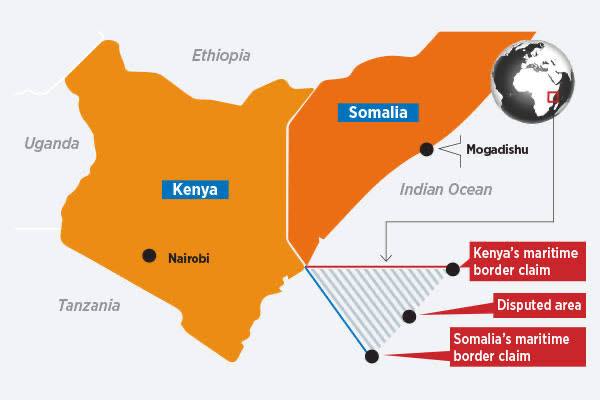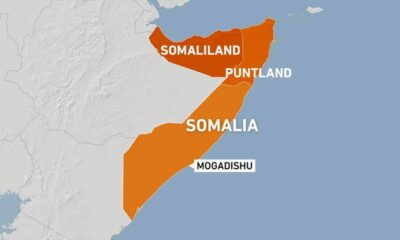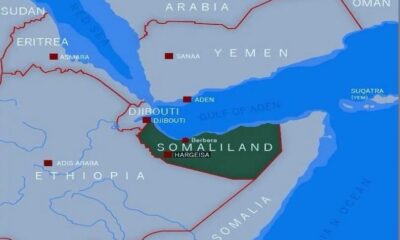Africa
Court Rules In Favor Of Somalia In Maritime Border Row With Kenya

The UN’s top court has ruled largely in favour of Somalia in its long-running dispute with Kenya over their maritime border.
Kenya said on Friday that in addition to withdrawing its participation from the current case, it had joined many other members of the U.N. in withdrawing its recognition of the Court’s compulsory jurisdiction.
It previously accused the International Court of Justice of bias and said it will not accept the ruling.
The case concerned a 38,000 sq mile (100,000 sq km) triangle in the Indian Ocean that is thought to be rich in oil and gas.
The dispute has been at the heart of a diplomatic row between the neighbours.
For the past four decades, Kenya has said a line due east of the point where the two countries meet at the coast represents the maritime border.
Somalia, however, argued in court that the sea frontier should follow on in the same direction as the land border.
The panel of 14 judges sitting in The Hague said that Kenya had not proved that Somalia had previously agreed to its claimed border.
Instead, they drew a new line which has split the disputed area in two.
But with Kenya refusing to recognise the ICJ’s jurisdiction it is not now clear what will happen. The court has no means to enforce its rulings.
In 2009, the two countries had agreed in a memorandum of understanding, backed by the UN, to settle the boundary dispute through negotiation.
But five years later, Somalia said the talks had failed and it went to the ICJ instead. The Reuters news agency reports that Somalia was angered by Kenya selling exploration licenses in the disputed zone to two multinationals in 2012.
The court is supposed to be the final arbiter in disputes between nations.
Kenya argued unsuccessfully that the ICJ should not be involved as the memorandum of understanding was binding.
Then in March it refused to take part in hearings after having asked for a delay to brief a new legal team.
It also objected to the presence on the ICJ panel of a Somali judge, saying he should recuse himself.
Last week, Kenya’s government described the case as a “flawed judicial process”. It added that there was “inherent bias” and that the court was an unsuitable way to resolve the dispute.
Kenya Insights allows guest blogging, if you want to be published on Kenya’s most authoritative and accurate blog, have an expose, news TIPS, story angles, human interest stories, drop us an email on [email protected] or via Telegram
-

 Grapevine2 weeks ago
Grapevine2 weeks agoRussian Man’s Secret Sex Recordings Ignite Fury as Questions Mount Over Consent and Easy Pick-Ups in Nairobi
-

 News1 week ago
News1 week agoTHE FIRM IN THE DOCK: How Kaplan and Stratton Became the Most Scrutinised Law Firm in Kenya
-

 Investigations2 weeks ago
Investigations2 weeks agoMulti-Million Dollar Fraud: Three Kenyans Face US Extradition in Massive Cybercrime Conspiracy
-

 Economy1 week ago
Economy1 week agoIran Demands Arrest, Prosecution Of Kenya’s Cup of Joe Director Director Over Sh2.6 Billion Tea Fraud
-

 Business2 weeks ago
Business2 weeks agoA Farm in Kenya’s Rift Valley Ignites a National Reckoning With Israeli Investment
-

 Grapevine6 days ago
Grapevine6 days agoA UN Director Based in Nairobi Was Deep in an Intimate Friendship With Epstein — He Even Sent Her a Sex Toy
-

 Africa2 weeks ago
Africa2 weeks agoFBI Investigates Congresswoman Ilhan Omar’s Husband’s Sh3.8 Billion Businesses in Kenya, Somalia and Dubai
-

 News2 weeks ago
News2 weeks agoTragedy As City Hall Hands Corrupt Ghanaian Firm Multimillion Garbage Collection Tender




























